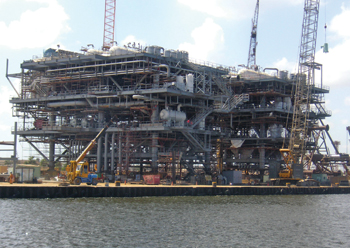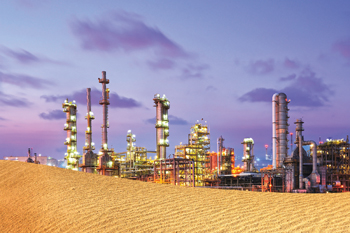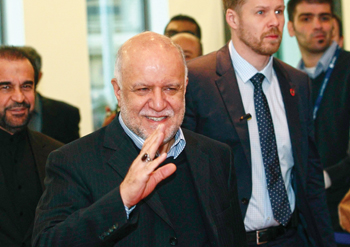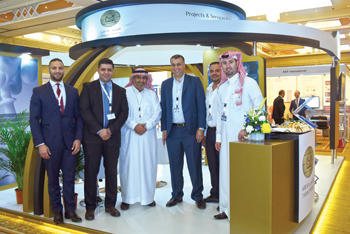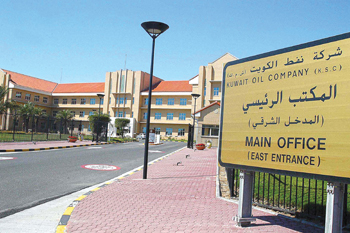
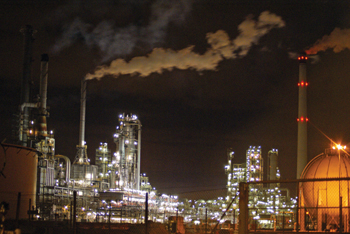 KPC ... on track to achieve production targets
KPC ... on track to achieve production targets
The company has been seeking to enlist foreign expertise to help it expand and maintain domestic oil production levels, even as it prepares for a longer period of lower oil prices
The Kuwait Petroleum Corporation (KPC) is expected to invest up to $100 billion over the coming five years to achieve the strategic directions of the oil sector until 2030, CEO Nizar Al Adsani says.
'We anticipate an expenditure of $100 billion over the next five years to achieve this target, half of which is already committed to specific identified projects,' Al Adsani says.
KPC has signed a Memorandum of Understanding (MoU) with K-sure and Koexim, the Korean Credit Agencies, for a total of $ 11 billion to finance the upstream, downstream, petrochemicals and transportation projects of KPC and its subsidiaries, Al Adsani says. 'KPC also is studying other means of financing such as bonds, sukuk, project bonds and this will open up the possibility of KPC being rated by the major international credit agencies,' he adds.
Meanwhile, Al Adsani notes that 'low oil prices have been a prominent feature of the market since the second half of 2014, and could stay lower for longer; posing challenge to our industry, but providing an opportunity to structural reforms, to achieve long-term benefits for countries.'
He points to forecasts that global exploration and production (upstream) spending would fall from about $850 billion in 2014, by more than 20 per cent, in 2015, while the level in 2014 over 2013 had increased by 3 per cent. It will take time, probably two years for these changes to have an effect on future supplies. Global upstream spending is expected to decline by 18 per cent in 2016.
This would be the first time since 1986, that consecutive declines in spending were recorded, he says. It is a common sense that mature producing fields globally have an average decline rate of around 5 per cent, while world oil demand will continue to expand at a range of 1-1.5 million barrels per day (mbpd) annually, which means that the world markets would need some 5-6 million barrels per day of new crude annually, the CEO notes.
 |
|
Al Adsani ... continuing to invest |
This shows the importance of continuity of investments in the upstream globally for the sake of stable markets, and to avoid volatility as well as spikes in oil prices. Producers of crude oil have financial surpluses and tend to redistribute income via investment.
The scale of the global effect is significant, he says. That boost is then amplified if it generates a subsequent lift in confidence, encouraging companies to invest and spend. 'We, at Kuwait Petroleum Corporation recognise that it is also a great risk if we do not make investments,' Al Adsani states.
Meanwhile, Kuwait has selected the winners of three major upstream deals that are crucial to the Opec member’s long-standing ambition to raise oil production capacity to 4 mbpd by 2020, from about 3.2 mbpd at present.
A senior Kuwaiti industry source says that a 'decision was made' on the award of all three enhanced technical services agreements (ETSAs), for which international oil companies (IOCs) BP, Royal Dutch Shell and Total had submitted their final bids in February.
The official declines to identify the winners; IOCs were given the option to bid for one or more of the contracts.
The five-year service agreements, extendable by one year, cover work at the Greater Burgan onshore oil field, a water management program at several onshore fields, and the Lower Fars heavy oil development at the Ratqa field in northern Kuwait.
KPC has been seeking to enlist foreign expertise to help it expand and maintain domestic oil production levels, even as it prepares for a longer period of lower oil prices. While the exact value of the deals isn’t clear at this point, it is expected to run in the 'hundreds of millions of dollars,' a Kuwaiti official says.
IOCs are also set to help KPC lower operating costs under the ETSAs, which offer them a rare opportunity to become involved in the Gulf Arab state’s upstream sector. The awards also come at a time when IOCs are making their own cost cuts, shedding thousands of jobs and canceling or delaying investment decisions on capital-intensive projects.
The ETSAs will have a similar structure to a deal signed between KPC upstream subsidiary Kuwait Oil Co (KOC) and Shell in 2010, which involved payment of a variable fee for work carried out at the Jurassic deep gas reserves scheme, which will also produce significant volumes of liquids. Under the five-year contract, Shell was to be paid about $800 million but Kuwaiti officials estimated the company would only get around $450 million based on actual work completed.
Shell’s Jurassic ETSA was earlier this year extended for the second time by 12 months until March 31, 2017. The deal was originally due to be extended by another five years upon expiry but got caught up in a drawn-out parliamentary investigation and was subsequently extended by only one year. The contract is set to be re-tendered once it expires.
Kuwait has been in talks to sign ETSAs -- improved versions of the original technical service agreements on offer -- to get more IOCs involved in its upstream since 2009, but apart from the Shell deal, no others had been concluded. Attempts failed in part because Kuwait’s parliament has been critical of foreign investment in its oil industry.
While the ETSAs are pivotal to Kuwait reaching its 4 mbpd target, the country will also need to see production from the Neutral Zone shared with neighbor Saudi Arabia come back on line to hit that level. Neutral Zone output has been affected by a political dispute between the two countries over the 400,000 bpd producing fields in the area.
KPC’s crude oil production hits nearly 3 mbpd while exports are at 2.1 mbpd, KPC’s managing director for International Marketing Nabil Bouresli says.
Bouresli says 80 per cent of Kuwaiti crude and oil products were sold to the eastern hemisphere, 15 per cent to the western hemisphere and 5 per cent to Africa.
Bouresli says that Kuwait planned to increase its crude oil production by 150,000 bpd in the third quarter of 2016, taking total output to 3.15 mbpd.
Kuwait plans to increase its crude oil production capacity to 4 mbpd by 2020.
 |
|
KPC ... keeping up exploration |
Kuwait has also inked a $2.93 billion contract with three South Korean firms for the construction of the largest Liquefied Natural Gas (LNG) import facility in the country. The project, to be built at the Al-Zour refinery near the border with Saudi Arabia, was awarded to Hyundai Engineering Co, Hyundai Engineering & Construction Co and Korea Gas Corporation.
CEO of national refiner Kuwait National Petroleum Co Mohammad Al-Mutairi, who signed the contract, says the project is slated to be completed in the first quarter of 2021. Opec member Kuwait is rich with crude oil but its natural gas production is too small to meet its needs. Every year it imports large LNG quantities to supply power plants, especially during the summer, and for use in the petrochemicals industry.
The facility will be part of a huge complex being built in Al-Zour, south of Kuwait City, which will also house a state-of-the-art 615,000 barrel-per-day refinery and a petrochemicals plant. Mutairi says the cost of the complex is expected to reach $30 billion.
In October, Kuwait awarded contracts worth $13.2 billion to 10 international firms to build the refinery, which is set to come on stream in late 2019. In 2014, the emirate gave out contracts for a $12 billion project to upgrade two of its three existing refineries. Kuwait sits on 101.5 billion barrels of crude reserves-equivalent to around 7.0 per cent of the world’s proven reserves, according to the latest Opec figures-and pumps around 3.0 million barrels per day.
In another development, BP and Kuwait Petroleum Corporation (KPC) have signed a framework agreement to explore possible joint opportunities for investment and cooperation in future oil, gas, trading and petrochemicals ventures. Al Adsani signed the agreement with BP CEO Bob Dudley. The framework paves the way for both companies to jointly invest and cooperate in oil and gas projects in Kuwait and globally.
BPs commitment to Kuwait dates back to our participation in the discovery of the giant Burgan oil field in the 1930s and we are there today extending the life of the field, Dudley says. 'We look forward to working with KPC to help the people of Kuwait realize the full potential of their nation’s oil and gas resources and exploring new opportunities globally,' he says.
In addition to enhancing oil and gas recovery from Kuwait’s existing resource base, the agreement also includes the intention to study opportunities for joint investment in future oil and gas exploration both inside Kuwait and globally.
Other elements of the agreement cover possible future oil and gas trading deals including LNG trading and related ventures. Opportunities for cooperation and investment in midstream and petrochemical projects globally will also be considered under the agreement, including potentially deploying BPs proprietary paraxylene technology as part of KPCs petrochemicals projects.
Meanwhile, KPC has met with several of its subsidiary firms to discuss plans to pare back salaries and cut expenses as the state oil company grapples with the low price of crude.
Among the measures being considered are lay-offs and the suspension of bonuses, as well as a move to hire expats on a contractual basis in order to reduce the cost of their salaries and associated costs, such as medical, travel and housing expenses.
Other changes include cutting back on flight costs and travel allowances for senior officials.
Sources told local media that the plans could save up to $630 million a year.
KPC had met with officials from Kuwait National Petroleum Company (KNPC), Kuwait Oil Company (KOC) and Petrochemical Industry Company (PIC) to discuss the changes.
However, sources also say that oil sector employees have refused the measures, saying they had been guaranteed the privileges by law and the treaties stipulated in KPC’s subsidiary companies’ charts.
Al Adsani says the financial reforms will allow the private sector and Kuwaiti citizens to play larger roles in bidding for and co-owning oil service activities.
He says a dedicated plan was being prepared to launch and privatise 42 petrol stations, despite the rationalisation initiatives covering both citizens and expat employees.
KPC is a state-owned integrated energy company, that has operations throughout oil and gas value chain including, exploration, production, development, refining and marketing, and transportation business activities related to petroleum products. Its significant focus on research and technology has enhanced its business operations.
Moreover, its supply agreements with Ethiopian Petroleum Enterprise (EPE) and Pakistan State Oil Company (PSO) coupled with prospects in northsea would enhance its operations further. However, volatility in oil and gas prices, rising capital cost and exploration and development risks would affect its operations.
The company has a significant focus on research and technology. KPC’s research and development centres include GC-01 Kuwait Integrated Digital Field (KwIDF) project in South and East Kuwait; Burgan Collaboration Centre; and Q8 Research & Technology Centre located in the Netherlands.
The company takes up various research and development projects, including a project in cooperation with the Kuwait Institute for Scientific Research (KISR), for service on the evaluation and combating the growth of microbes at fuel storage warehouses in Ahmadi and Shuaiba refineries; and a project regarding an environment-friendly catalysts used for industrial gas flaring about Kuwait University.
The company has a research and technology roadmap for 2030 being implemented. They completed a study to meet the requirements of the Kuwaiti oil sector on developing solar energy technology. The company’s significant focus on research and technology has enhanced its position in the competitive market.
The company’s presence in various countries where there is a demand for its products helps it expand its business further and increase its revenues. The company operates in various locations including, Kuwait, Pakistan, India, the US, China, Japan, Singapore and the UK.
The operations of the company are strategically located either near the raw material or an important market for the product. The company operates in the US through its office in Houston, Texas, which is known as oil capital of the world, and in emerging economies like India and China, where the demand for oil is more. The global presence of the company gives it a strategic advantage over its competitors.
KPC is one of the world’s largest integrated oil companies. The company operates through its subsidiaries in all aspects of the hydrocarbon industry, such as, onshore and offshore upstream exploration, production and refining, marketing, retailing, petrochemicals, and marine transportation.
KPC’s domestic upstream operations are carried out by its subsidiaries Kuwait Oil Company (KOC) and Kuwait Gulf Oil Company. Its subsidiary Kuwait Foreign Petroleum Exploration Company (Kufpec) carries out upstream exploration and production activities in regions outside Kuwait.
The company’s domestic downstream operations includes, refining, gas liquefaction, chemicals and fertilisers, petrochemicals, marine transport and aviation fueling. Its domestic refinery operation is carried out by Kuwait National Petroleum Company (KNPC), which has three integrated refineries. Petrochemical Industry Company, a subsidiary of KPC, operates the domestic petrochemical complex.
Kuwait Oil Tanker Company operates KPC’s marine transport segment and Kuwait Aviation Fuelling Company operates its aviation fueling segment. Its international downstream operations include, crude oil refining, petrochemicals and international marketing. Kuwait Petroleum International, its international subsidiary operates the international refinery business.
Oil Services Company, provides support services to its operations such as fire, security and consultancy. Oil Development Company oversees and regulates the development of the northern oilfields, known as Project Kuwait. The company’s integrated business operations have enabled the company to optimize its operations.
KPC’s operations could get affected with the leakage at its subsidiaries’ operational sites. In March 2015, the company‘s subsidiary reported leak in a water treatment unit tank at its Mina Abdullah refinery. The company initiates anti-leak plan immediately after discovering the leakage. KOC’s operating equipment were used for containing the leaks. Such leaks and operational issues could affect the company’s operations.
KPC could further strengthen its operations with the new growth initiatives by its subsidiaries. In October 2014, Kufpec signed a Memorandum of Understanding (MoU) with PMI Comercio International (PMI), one of the international group of companies of Petrleos Mexicanos (Pemex).
The agreement includes cooperation between the two companies in the evaluation and pursuit of mutual business opportunities in the field of new investments for the exploration and production of oil and gas in Mexico and worldwide.
In August 2014, the company signed a $2 billion crude oil supply contract with Petron Singapore Trading Limited, a subsidiary of Petron.



































































